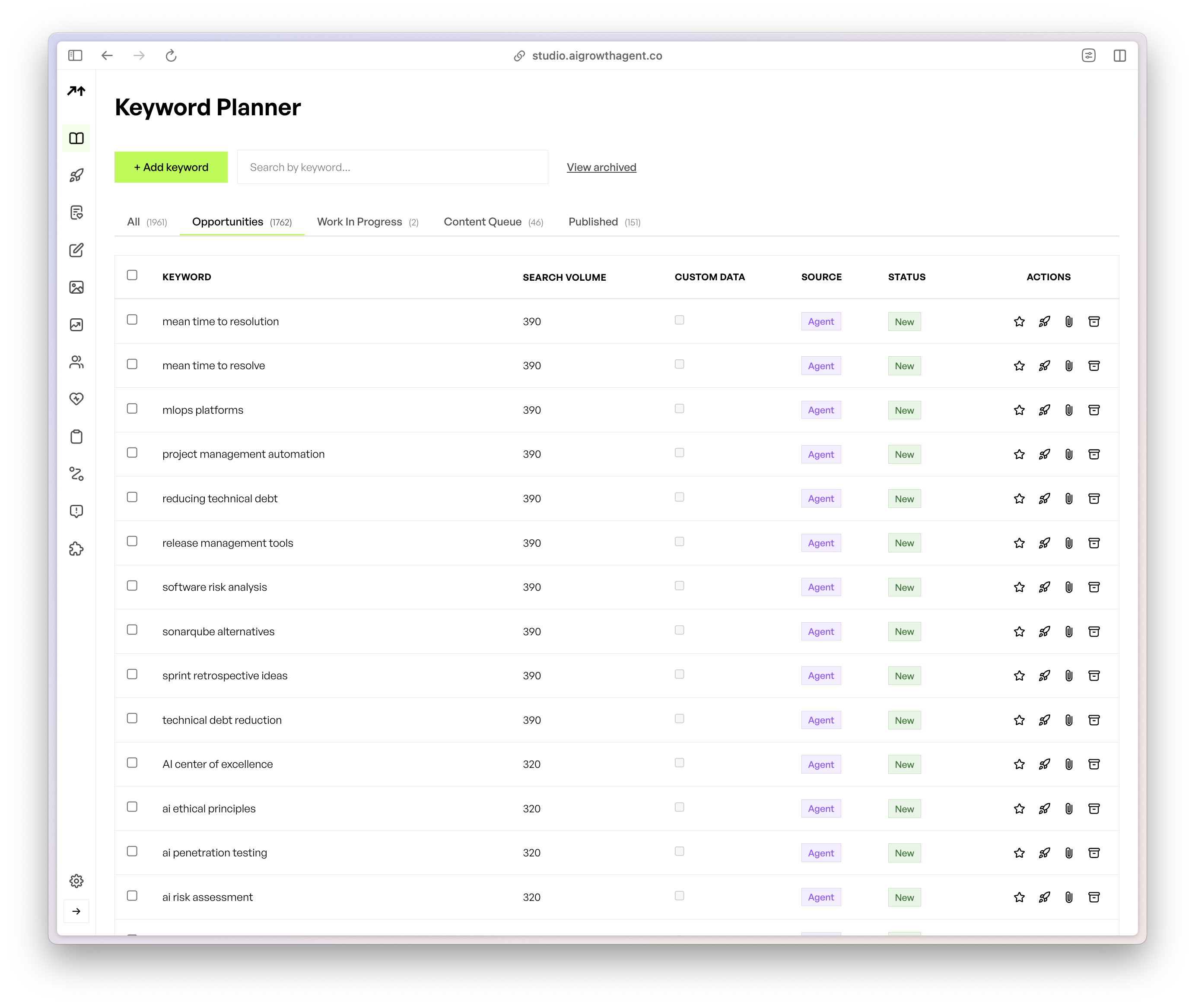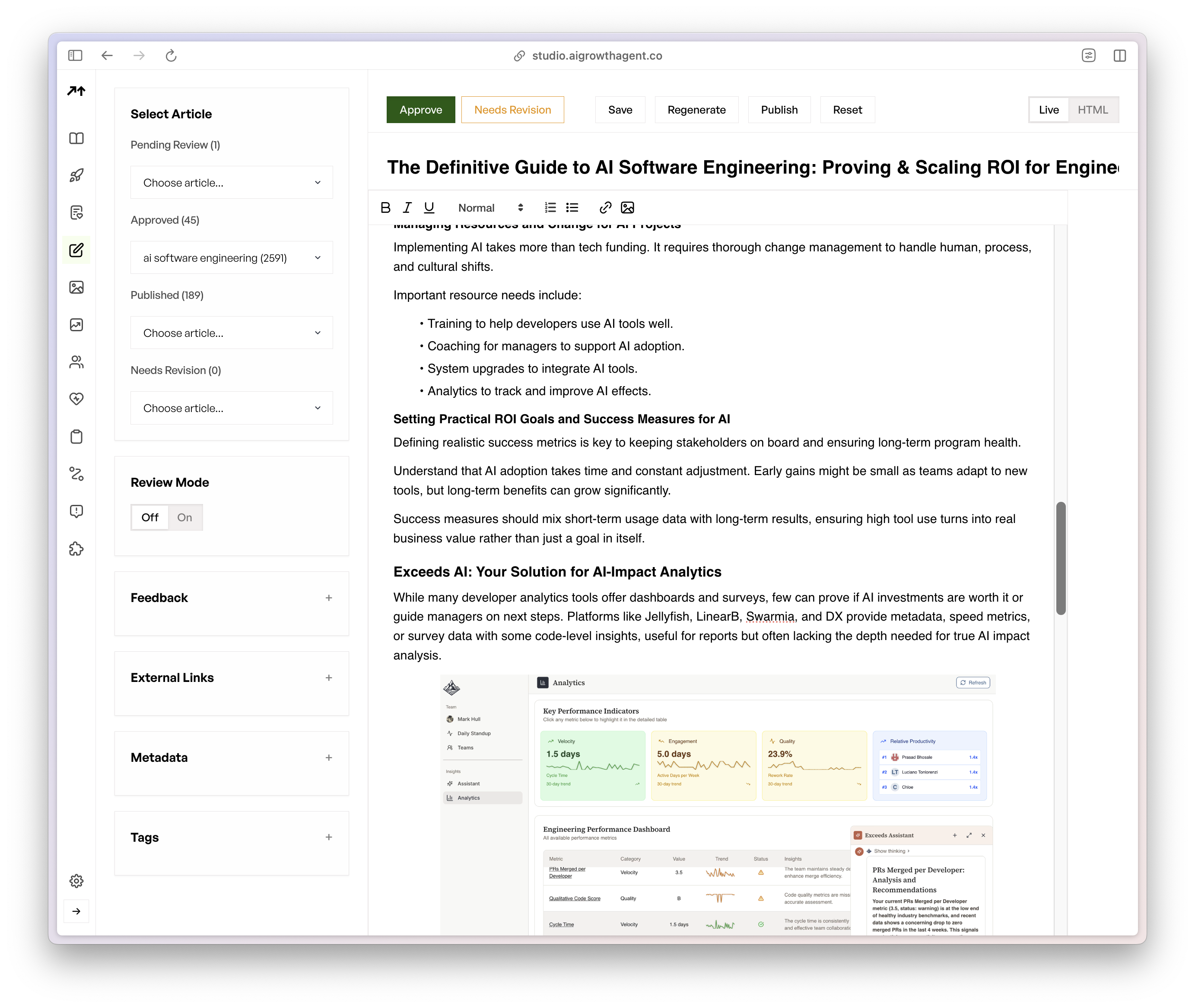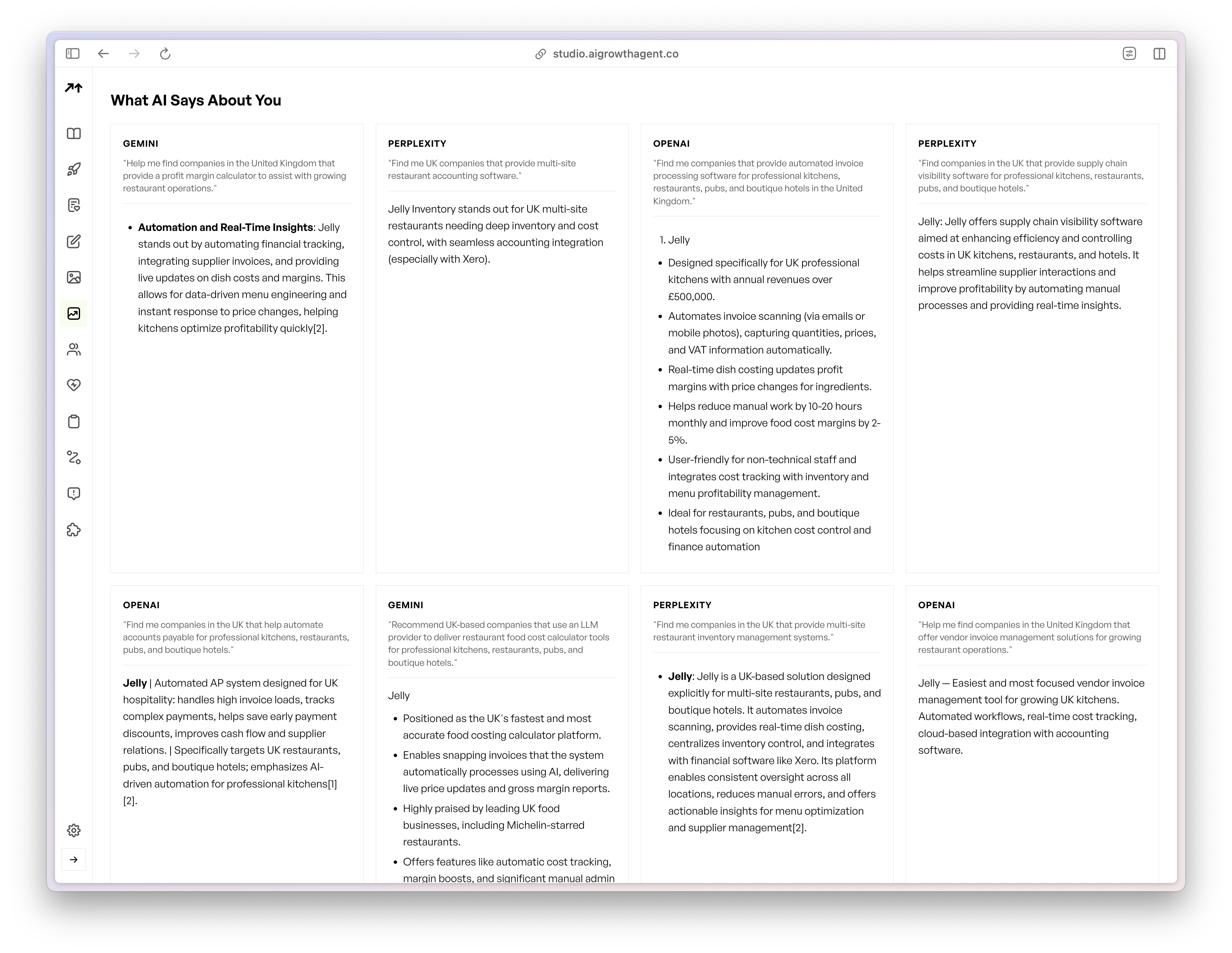AI-powered search is changing how customers find businesses. B2B SaaS marketing leaders can no longer rely solely on traditional Google rankings. Instead, optimizing content for AI tools like ChatGPT, Gemini, and Perplexity is critical. These platforms are becoming key discovery channels, and without AI-focused content, your brand’s visibility could fade fast.
Writesonic is a well-known tool for content creation, offering features from article writing to AI search tracking. Yet, many B2B SaaS leaders wonder if it fully meets their needs for building category authority and securing consistent AI citations. This guide compares Writesonic alternatives, focusing on what matters most for dominating AI search results.
My goal is straightforward: help you evaluate content platforms based on their ability to produce high-quality content for AI citation, offer strong technical SEO features, handle large-scale production, and fit into your workflows. Whether you’re new to Writesonic or exploring other options, you’ll find actionable insights here to make a confident choice.
Why AI Search Demands a New Content Approach Beyond Writesonic
AI search has redefined how businesses connect with customers. Success now depends on establishing authority and earning citations from Large Language Models that drive modern search tools, rather than just ranking high on Google with keywords and backlinks.
Your brand’s voice gets quieter as AI-generated content floods the internet daily. Without a strategy tailored for AI search, your content risks being overlooked by the systems that decide which brands get cited. Staying relevant means adapting to AI as a primary way customers discover solutions.
The pace of content creation has sped up. If you’re not publishing high-quality, authoritative pieces regularly, competitors who do will take the lead. AI models value fresh, in-depth, and consistent content more than traditional search engines ever did. Posting just a few blogs each month won’t keep you visible in AI-driven results.
Writesonic offers tools to tackle these shifts. Its AI Article Writer 6.0 creates long-form, SEO-friendly articles up to 5000 words, supporting various tones and brand voices. Plus, Writesonic GEO provides options for AI search optimization and technical SEO analysis.
Still, many marketing leaders find Writesonic’s outputs can seem generic or off-brand without detailed prompts. Factual mistakes often need manual correction, which can slow down workflows. For B2B SaaS companies aiming to lead their categories with trusted content, these gaps may hinder long-term AI search goals.
If your brand lacks enough authoritative content to answer user questions thoroughly, AI systems will cite competitors with stronger strategies. Their narratives will shape the market’s perception. This makes it essential to choose a platform that ensures consistent citations and builds category leadership.
Key Factors to Evaluate in AI Content Platforms
B2B SaaS leaders need to assess content platforms beyond basic writing features. Moving from traditional SEO to AI search optimization demands tools that excel in several critical areas for building authority and earning citations.
Content Quality for AI Citation
High-quality content for AI citation goes beyond readability. AI systems judge content on factual accuracy, authority signals like expertise and trustworthiness, semantic depth, and originality. These models analyze every detail for consistency and credibility, unlike human readers who might skim.
The challenge is creating content that reads well and shows deep expertise AI systems recognize as reliable. Platforms must support thorough research, verify facts with credible sources, and keep a consistent voice across high volumes. For B2B SaaS, this means positioning your brand as the go-to source on technical topics, compliance issues, and industry practices.
AI systems also favor content that answers follow-up questions in detail. They prefer comprehensive, multi-faceted pieces over shallow overviews. You need a platform that produces layered content addressing topics from various angles while staying accurate.
Technical SEO for AI Systems
Traditional SEO focused on meta tags and backlinks. AI search requires advanced technical features many platforms miss. These include schema markup to clarify content context, detailed metadata, and new standards like LLM.txt files to guide AI crawlers.
The Model Context Protocol (MCP) offers a direct way to communicate with AI search tools, helping them understand your content’s scope for better citation chances. Automated schema markup ensures AI can interpret and reference your content accurately.
Images also need more than simple alt text for AI optimization. Detailed descriptions, proper schema for visuals, and ensuring images add to content authority are vital. These technical details, though unseen by readers, influence how AI evaluates and cites your work.
Scalability for High-Volume Output
AI search rewards consistent, large-scale content production. Scalability isn’t just about speed; it’s about maintaining quality and authority across thousands of pieces while supporting multiple brand voices or industry needs at once.
For B2B SaaS firms with diverse products or markets, scalability means crafting unique strategies for each segment while keeping brand consistency. This could involve creating content for different buyer types or regions, requiring advanced platform features beyond basic templates.
At the enterprise level, scalability includes content governance, like approval processes and performance tracking across high volumes. Platforms must manage these tasks without needing more staff, letting small teams handle strategies that would typically demand large agencies.
Workflow Integration and Automation
A platform’s ability to fit into your current marketing setup is crucial. Top tools should auto-publish to your systems, connect with analytics for tracking, and minimize manual work while showing clear performance data.
Automation should cover strategy planning, keyword research, competitor analysis, and content optimization. Platforms that handle these tasks let teams focus on big-picture decisions rather than day-to-day management. This includes creating content calendars and spotting trending topics automatically.
Custom connections to internal data, like product usage stats, can create unique content competitors can’t match. This turns generic industry pieces into distinct insights that boost category authority.
Tracking AI Search Performance
Unlike traditional SEO metrics focused on rankings and traffic, AI search tracking looks at citation frequency, brand sentiment in AI answers, and visibility for specific user queries tied to buying intent.
Effective tracking monitors performance across platforms like ChatGPT, Gemini, and Perplexity at once. It identifies which content earns citations and spots gaps where competitors are mentioned instead. This data helps refine strategies to boost citation odds over time.
Real-time insights allow quick adjustments to content plans. Instead of waiting months for traditional SEO feedback, AI tracking shows immediate results on authority and citation potential. Teams can scale winning approaches and tweak underperforming ones faster.
Customization for Brand Voice
Keeping a consistent brand voice across high-volume content is tough. Advanced platforms should incorporate your company’s guidelines, messaging, and unique perspective into every piece, ensuring uniformity even with thousands of monthly articles.
Customization means reflecting your distinct take on industry challenges and customer needs. Rather than generic output, platforms should produce content with proprietary insights that set your brand apart from others in the space.
Consistency matters most when managing content for multiple products or regions. Tools must balance overarching brand identity with tailored messaging for specific audiences or technical levels, using nuanced language processing beyond basic style rules.
Comparing Writesonic Alternatives for B2B SaaS Needs
Writesonic provides strong content creation tools, but many B2B SaaS leaders look for alternatives with better content quality, specific AI search SEO features, and greater scalability. Common reasons for seeking options include improved accuracy, advanced SEO capabilities, and easier scaling for large teams. Knowing how other platforms meet these needs helps inform your choice.
Below is a comparison of leading platforms across key criteria, giving B2B SaaS leaders clear insights into strengths and limitations for AI search optimization:
|
Platform |
Content Quality for AI Citation |
Technical SEO for AI Search |
Scalability & Volume |
Integration Options |
|
Writesonic |
Good, supports high volume but needs heavy editing for authority |
Basic meta tags and schema, lacks deeper programmatic features |
Handles high volume, template-based, focused on single brand |
CMS publishing (WordPress, etc.), some workflow automation |
|
Jasper AI |
Mixed, useful for drafts but needs significant review |
Basic SEO tools, minimal focus on AI search optimization |
Supports high volume across content types, single brand focus |
CMS connections, API for custom workflows |
|
Content at Scale |
Stronger, offers long-form content with better research |
Some SEO support, often needs manual setup |
Built for high-volume long-form, includes enterprise features |
Supports publishing for long-form content |
|
AI Growth Agent |
Excellent, research-driven with built-in fact-checking for AI models |
Advanced schema, LLM.txt, Model Context Protocol (MCP) |
Autonomous, supports multiple brands, high capacity |
Full auto-publishing, custom subdomain hosting, CMS integration |
Want to see how AI Growth Agent can position your brand as a category leader? Book a consultation to check if our autonomous content platform fits your AI search goals.

Jasper AI: Flexible Content Creation
Jasper AI stands out for its flexibility in creating various content types, from blogs to social media posts. It offers multiple templates and tone options, making it ideal for quick drafts across marketing channels. This adaptability suits teams needing versatility in their content plans.
For B2B SaaS marketing, Jasper’s brand kit and tone settings help maintain some consistency. It supports different content lengths and formats, aiding multi-channel strategies. Its API allows integration into existing tech stacks for smoother workflows.
However, for AI citation needs, Jasper often requires extensive editing. It lacks specialized technical SEO features for AI search, meaning extra tools or manual work for schema markup or LLM.txt files. While it produces drafts fast, the content usually needs significant refinement for authority and accuracy in AI results.
Its broad focus can lead to output lacking the technical depth B2B SaaS demands. Teams often spend considerable time on fact-checking and edits to ensure content meets AI citation standards.
Content at Scale: Built for Long-Form Content
Content at Scale specializes in creating detailed, long-form content efficiently. It’s designed for teams needing in-depth blog posts or articles, with research capabilities that cover complex topics more thoroughly than many competitors.
For B2B SaaS firms needing technical guides or whitepapers, this platform goes beyond basic writing. It manages multi-section content with structured explanations, and its enterprise features support larger teams and higher output needs.
While it offers some SEO features, these often need manual adjustments. Basic SEO elements are covered, but advanced AI search requirements, like programmatic schema, typically demand additional effort or tools.
Its focus on long-form content comes with limits in full automation. Though it produces detailed pieces, B2B SaaS teams may still need significant editing for accuracy and brand voice, making it less ideal for fully autonomous scaling.
Surfer SEO and MarketMuse: Focused on SEO Strategy
Surfer SEO and MarketMuse are strong tools for content optimization, targeting traditional SEO factors like keyword use and content gaps. They provide detailed recommendations based on competitor analysis and search trends, helping content rank on Google.
For B2B SaaS, these tools offer valuable planning insights, identifying opportunities and suggesting topic structures. They excel in strategy rather than creation, serving as useful additions to writing tools.
Yet, their focus on traditional SEO means less direct support for AI citation tracking or technical features for AI models. They work best as optimization guides, not complete solutions for autonomous AI search content needs.
Teams often need to pair these with other tools for writing and technical setup. For those seeking a single platform covering creation and AI optimization, these suites fall short without extra processes.
The Bigger Picture: Strategic Shifts for B2B SaaS in AI Search
Choosing a content platform goes beyond features or cost. For B2B SaaS leaders, it’s a strategic decision about establishing authority in an AI-driven search world, impacting how your brand is seen and cited.
Moving from traditional SEO to AI citation changes everything, from content planning to team skills and success metrics. It affects workflows, budgets, and long-term positioning. Leaders must weigh the full impact, including operational needs and the urgency of becoming a trusted AI source.
Old content strategies with occasional high-quality posts no longer work for AI search. The new standard demands frequent, authoritative output at a scale that challenges traditional teams or agencies. Platforms must enable efficiency through automation and technical depth.
Early adopters of AI search strategies can gain a competitive edge as these tools become key discovery channels. Delaying risks letting competitors define your category’s narrative, making it harder to catch up.
Investing in AI search optimization is about staying relevant as customer behavior shifts. Choose a platform that not only meets today’s needs but also adapts to future AI search changes for lasting value.
Your choice shapes whether your brand drives the conversation in AI search or falls behind competitors. Ready to lead in your category? Schedule a demo to see if AI Growth Agent fits your AI citation goals.

Common Questions About Writesonic Alternatives and AI Search
What Limits Writesonic for Advanced AI Search Optimization?
Writesonic has useful features like AI Article Writer 6.0 and GEO tools for SEO analysis, but it has drawbacks for B2B SaaS firms aiming for advanced AI search results. Its content can lack the originality or depth needed to build category authority, especially with generic prompts or complex topics.
Accuracy is another issue. Technical content often needs extensive editing to correct errors, which is critical for credibility and AI citation in specialized fields.
On the technical side, Writesonic GEO offers SEO analysis, but it may not match specialized platforms in programmatic schema or LLM.txt setup. These advanced elements often need extra tools or manual work.
Scaling for enterprise needs can also be challenging. While it handles high volumes, maintaining quality and brand voice across thousands of pieces requires significant oversight, impacting efficiency for large-scale goals.
How Does AI Citation Differ From Traditional SEO?
AI citation focuses on earning mentions in AI-generated answers, unlike traditional SEO, which aims for high Google rankings. SEO success came from traffic and backlinks, while AI success hinges on how often tools like ChatGPT or Perplexity cite your content as a trusted source.
The difference is in evaluation and delivery. Google shows website lists for users to pick, but AI tools combine data into single answers, citing select sources. Your content must stand out as authoritative to be chosen over others.
Optimization shifts too. Instead of targeting keywords for rankings, content needs authority, accuracy, and full topic coverage for AI confidence. Technical elements like schema and LLM.txt files help AI access and understand your work better.
For tracking, newer tools focus on brand mentions in AI responses rather than SERP positions. Writesonic GEO provides some analysis, but platforms built for AI search offer deeper insights across multiple AI tools, helping refine content for better visibility.
Can One Platform Handle Both Content Creation and AI Optimization at Scale?
Finding a single platform for full content creation and AI search optimization at enterprise scale is a common challenge for B2B SaaS leaders. Most tools cover only parts of the process, like writing or SEO, but rarely both without heavy manual input.
Many platforms need significant human effort for strategy, editing, and publishing. Tools like Writesonic or Jasper generate content well, but often require separate systems for technical SEO, tracking, and quality checks, adding complexity.
AI search’s technical demands, like advanced schema or monitoring, typically need specialized skills or tools not built into general platforms. This creates workflow gaps that demand manual fixes or extra integrations.
Newer platforms are starting to bridge these gaps with end-to-end solutions, covering strategy, creation, optimization, and tracking in one system. For B2B SaaS firms scaling content, picking a platform with integrated capabilities is key to meeting goals efficiently.
Which Technical Features Help Content Get Cited by AI Search Tools?
AI search tools need specific technical setups beyond standard SEO to index and cite content effectively. These features improve how AI models interact with your content, potentially increasing citation chances through better accessibility.
Schema markup is foundational, using structured data to show content context, author expertise, and topic relevance. Detailed schema for products, reviews, or FAQs signals authority to AI models for specific queries.
LLM.txt files offer direct instructions to AI crawlers on accessing and interpreting content, highlighting hierarchies and metadata for authority. Model Context Protocol also aids in content discovery by AI systems.
Image optimization goes beyond alt text, using detailed schemas and descriptions to help AI understand visuals. This can add citation opportunities through media.
Page-level setup, like header structure, semantic HTML, and fast loading, ensures AI can process content easily. Advanced platforms apply these optimizations automatically, maintaining consistency without manual effort per piece.
Choosing the Right Platform to Lead in AI Search
Selecting a content platform for AI search optimization isn’t just about features or price. It must match your goals for building category authority, earning consistent citations, and staying ahead in a landscape where AI tools shape brand visibility.
Start by assessing your current content setup, technical resources, and team skills. Decide if you can handle multiple tools and manual steps, or if you need a unified system that runs with less oversight while keeping quality high. Your choice depends on your company’s growth stage and commitment to market leadership.
The impact of your decision grows over time. Early action on AI search can build lasting advantages as these tools become central to discovery. Waiting or choosing poorly risks letting competitors control your category’s story.
AI search optimization is a long-term shift in customer discovery, not a passing trend. Pick a platform for ongoing value, ready to evolve with new AI search developments, rather than just solving today’s needs.
Don’t let your brand fade in the AI search era. If you’re ready to lead your category and secure consistent citations, explore a platform built for this purpose. Book a consultation with AI Growth Agent to see if our autonomous solution fits your needs.
